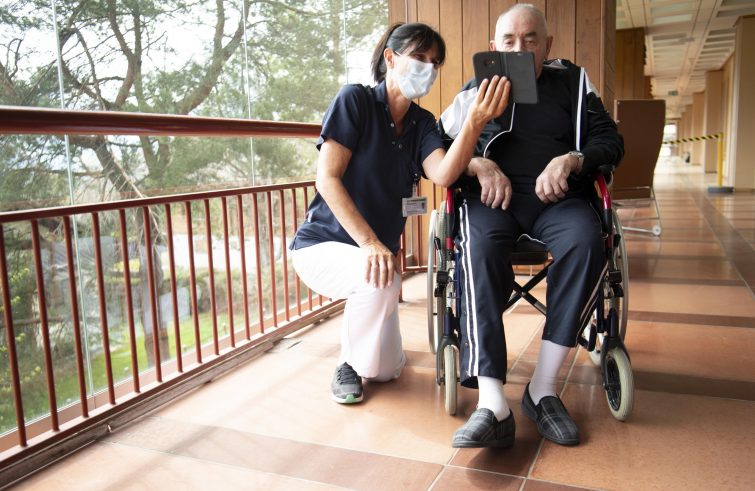
(from New York) – The growing number of deaths, close to 55,000, with almost one million infected, has forced US hospitals to face serious ethical dilemmas which, in the long run, are undermining values enshrined in the Constitution, upheld by the Civil Rights Commission. Ensuring healthcare for all without discrimination based on age, is provided for by the Age discrimination act of 1975. Yet the health system of Alabama, Connecticut, Louisiana, Michigan, as well as New York, Chicago and Milwaukee, has recently been marked by many black holes. Over the past few weeks President Trump evoked the spectre of a war against an invisible enemy, and while words like “front line”, “weapons” to combat the virus, health workers “in the trenches”, protective devices, are now part of everyday speech, statements advocating the right to healthcare and to treatments grow feeble, especially when beneficiaries are elderly people, the disabled or members of minority groups.
“The fact is that we don’t have enough resources to treat everyone, not even in the world’s largest economy. We don’t have enough ventilators and we don’t have enough ICU beds and this put health care workers in the position of being forced to make a choice.” Charlie Camosy, Associate Professor of Bioethics at the University of Fordham, provides a direct and blunt analysis. For weeks now, he has been urging health authorities and organizations to identify ways to streamline scarce resources while ensuring the respect of the human person and social justice. Unfortunately, federal protocols are lacking and there is no plan or debate on how to defend fundamental values without succumbing to the inevitable burden of the pandemic. Camosy mentioned the fact that Spanish hospitals, for example, have refused to treat people over 65 years of age and fears that “sheer utilitarianism, a prevailing concept in Western medicine and ethics, may become a code of conduct in blatant violation of civil rights, notably those of the elderly.” Hospitals recipients of federal funding “cannot exclude, deny or restrict treatment, or otherwise discriminate against people on account of old age.” Thus while the State of New York, except for a few exceptions, has refused to ration ventilators on age basis, the State of Washington has adopted a different approach, namely to consider transferring patients with “loss of physical” or “cognitive” function to facilities offering palliative care.
This is a blatant discrimination against the disabled, and a clear violation of civil rights, equally denounced by all patients waiting for a transplant or cancer surgery, sent home to give priority to Covid patients. Although the term “triage”, i.e. the selection of patients on the basis of rough estimates of the probability of survival, evokes war scenarios, doctors will unfortunately be faced – and in some cases have been faced – with taking such decisions. The New England Journal of Medicine stated that this form of health rationing “is often better tolerated if done in silence.” This is also one of the reasons why doctors and nurses have been cautioned against granting interviews, on penalty of dismissal.
In the USA, guidelines on resource rationing differ in every State, but many have decided to rank them according to the survival prospects of patients in the short and long term. Criteria adopted include priority to doctors and health care workers, as their recovery would ultimately contribute to the recovery of many others. So if a doctor requests a ventilator he has priority over other patients.
“Legislative choices are often driven by the utilitarian principle”
continued Camosy, speaking at a Zoom debate on the throwaway culture at a time of pandemic, organized by New City Press: “Utilitarianism aims to maximize total benefit, generally calculated on the basis of remaining years of life – or the quality of the remaining years. For example, if a 20-year-old man and an 80-year-old man both required a ventilator, the treatment of the 20-year-old would probably have maximized his lifespan. If faced with having to choose between two people of the same age, the criteria would be the quality of life expected after recovery. “It’s a classic example of what Pope Francis describes as the consumerist throwaway culture whereby the value of the human person is often measured in terms of quality or productivity. Especially when their dignity is most inconvenient to us, the most vulnerable are at risk of being discarded. And unfortunately there are no clear protocols on this issue.”
Camosy also warned against the risk faced by American culture prior to Covid-19: “the medicalisation of death, i.e. persevering with treatments that distance the process of death on patients who have no chance of recovery, leaving them disconnected from reality and their loved ones. How will that culture withstand these extraordinary circumstances, where ventilators will save only a few?”. According to the bioethics Professor, the pandemic, by preventing inpatients from having contacts with family members, could help us reconsider the final stages of the disease and encourage home-based health care, palliative care that accompany the patient while respecting their dignity. Camosy’s recommendation is likewise endorsed by the Association of Catholic Doctors which, in a 12-point guideline, in sections 7 and 8 recommend spiritual accompaniment by health care providers for patients in the final stages of their disease and, above all, that they should choose to die not alone in hospital, but at home, with appropriate treatment for this final stage of life.










